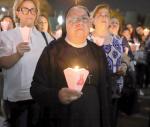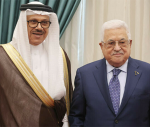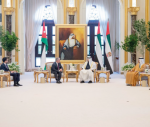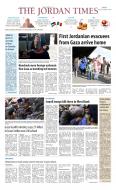You are here
FM urges international community to intervene to halt Gaza bloodshed
By JT - Oct 19,2023 - Last updated at Oct 19,2023
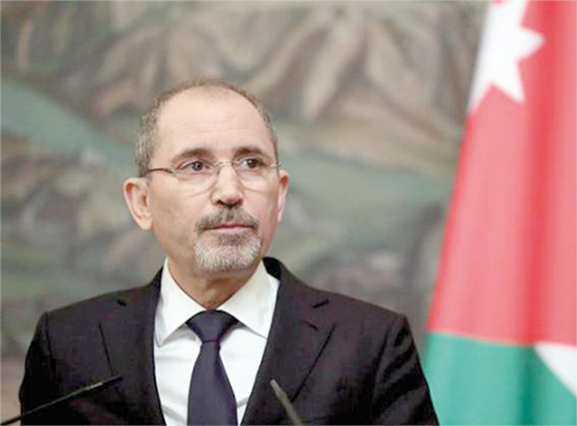
Ayman Safadi
AMMAN — Deputy Prime Minister and Foreign Affairs Minister Ayman Safadi reiterated Jordan's denouncement of the massacre of civilians at the Baptist Hospital in Gaza which is facing Israeli war, stressing that the international community should bear responsibility for this war, the bloodshed and Israeli war crimes.
In an interview with Al Jazeera, Safadi said that Jordan's position on the criminal hospital bombing was expressed by His Majesty King Abdullah, who said that "this massacre is a heinous war crime that cannot be ignored", according to a ministry statement.
The minister added that after the massacre of civilians at the Baptist Hospital and consulting with Palestinian, Egyptian and US officials, Jordan decided not to host the four-way summit, which was slated for Wednesday, in light of its inability to come out with the decisions required to stop the war.
He said that after consulting with "our Palestinian and Egyptian brothers and talking to the US, we have decided not to hold the summit. If this summit is to take place, we want only one outcome, and that is the end of war, respect Palestinian lives and deliver the aid that they are entitled to have".
Safadi said that communications with the US are ongoing as "we want it to play a role in stopping the war and also in ending what led us to the abyss of the conflict, which is the occupation, and to reach a real peace process, and we continue to consult with them, talk to them, to work with them, and with the entire international community and with our Arab brothers until we reach this end".
The minister added that Jordan is steadfast in its efforts as "our position is clear that this war will only bring destruction, and the whole world must know that the continuation of this war means a humanitarian catastrophe, means the danger of the expansion of this war".
Safadi stressed that the whole world ought to abide by international law and bring the region closer to humanitarian and moral norms that do not discriminate according to nationality or identity.
Jordan will not ignore what happened in Gaza and will convince the international community not to ignore it as well, as it plays a crucial role in engagement and ending this catastrophe and aggression, he said.
The minister also referred to His Majesty's talks with leaders of the UK, Italy and Germany, where efforts focused on rallying a unified international position to stop this catastrophic war.
The minister said that Israel is perpetrating a collective punishment. According to international law, banning food and medicine supply to civilians is a war crime.
International law and the fourth Geneva Convention and its appendix of 1977 also say that displacing Palestinians is a war crime too, Safadi said.
He stressed that Jordan’s popular and official stances are identical and called for halting this aggression, supporting the Palestinian people and protecting Palestinian civilians from death and destruction.
What happened in Gaza on Tuesday night must result in a different position from the entire world, leading to the rejection of the war, Safadi said.
If the world is not clear in refusing and condemning the war, the double standards approach and discrimination based on nationality and identity will become a reality, which will only lead to further conflicts.
The minister warned that “We don’t want this war to become an Islamic, Arab war with the West,” calling on all to be aware that supporting Israel in this attack that crossed all borders does not follow humanitarian standards, international law, nor serves regional security and stability.
He said that once His Majesty’s arrived in Amman after his European tour, he headed for a meeting to discuss preparations to offer humanitarian support to Palestinians, including an “unprecedented airlift to deliver assistance to the Jordan field hospital and transfer injured Palestinians to Jordanian hospitals when possible”.
Safadi said that scenes from 1948 and 1967 still linger in the memories of refugees, Arab and Jordanians, and it would be a “shame for the world to allow the same scenario to happen again.”
Related Articles
AMMAN — The "usurped entity" has gone too far in Palestine by committing heinous massacres, the latest of which is the bombing of hospitals,
AMMAN — Lower House Speaker Ahmad Safadi on Tuesday said that the Israeli occupation forces’s bombing of the Al Ahli Arabi Baptist Hospital
AMMAN — His Majesty King Abdullah on Tuesday expressed his absolute condemnation of the ugly massacre perpetrated by Israel against innocent
Opinion
Nov 03, 2023
Nov 03, 2023
Nov 01, 2023
- Popular
- Rated
- Commented
Nov 03, 2023
Nov 03, 2023
Nov 01, 2023
Newsletter
Get top stories and blog posts emailed to you each day.



